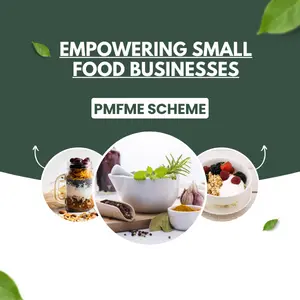Posts Tagged with “pmfme scheme subsidy”
PMFME Scheme – Empowering Small Food Businesses

A variety of food products are served by the Indian food processing industry. They contribute a great deal in the employment generation, around 74%, as well as to the overall growth of the nation. However, a sizeable portion, over 25 lakh units, of this industry forms of unorganized and informal micro enterprises. These often face challenges pertaining to finance, modern technology and market linkages.
Alleviating these obstacles, the Government of India has launched the Pradhan Mantri Formalisation of Micro Food Processing Enterprises (PMFME) Scheme hoping to unlock the potential of the micro food processing sector.
About the PMFME Scheme
An ambitious initiative by the Government, PMFME scheme shall provide financial, technical and business support to the micro food processing units across India. The scheme was launched in 2020 for five years 2020-21 to 2024-25, as a part of Aatmanirbhar Bharat Abhiyan (Self-Reliant India Campaign). The Ministry of Food Processing Industries (MoFPI) implemented the scheme.
Vision with PMFME Scheme
With a specific focus on boosting and formalising the existing micro enterprises PMFME scheme was launched. A special emphasis has been put on supporting Farmer Producer Organisations (FPOs), producer cooperatives and Self-Help Groups (SHGs) engaged in the agri-food processing activities. The government wants to improve the growth and functioning of these informal organisations by giving them the resources and support they require.
The campaign is centrally supported, with a shared government responsibility and an expense of INR 10,000 crores split over five years.In most states, the ration of bearing the finance comes to 60:40 for central and state government, respectively. Yet, the cost-sharing ratio for the North-Eastern and Himalayan States remains 90% being borne by the central government. This strategic allocation targets at reaching he grassroots level, the remotest corners of the country. Enhancing their bargaining power, this scheme would empower the small and marginal farmers, as a result, promoting sustainable agricultural practices.
Primary Objectives of the PMFME Scheme
- Formalization of the informal micro food processing enterprises
- Providing access to credit and affordable capital
- Enabling modern technology and skill upgradation
- Facilitating market linkages and supply chain integration
- Promoting women entrepreneurs and entrepreneurship in the food processing sector
Addressing the key areas mentioned above, the main aim remains to enhance the competitiveness, productivity and profitability of the micro food processing units. This will in turn contribute to the overall growth of the food processing industry in India.
Key Components of the PMFME Scheme
| Seed Capital Support | For urban units, INR 40,000, while for rural units INR 50,000 This would cover initial expenses including necessary licenses, registrations and certifications. |
| Credit-linked Subsidy | For upgrading existing units and setting-up new units- 35% subsidy on eligible project costs (up to INR 10 lakhs per unit) For common infrastructure and capital expenditure of SHGs, FPOs and Cooperatives- 35% subsidy on eligible project costs (up to INR 10 crore) with maximum subsidy limit of INR 3 crore For overall branding and marketing- 50% of overall cost. This includes support for participating in domestic and international trade fairs, e-commerce platforms and exhibitions. |
| Merging with other Schemes | Pradhan Mantri Mudra Yojana Stand Up India |
| Skill Development and Capacity Building | Includes training programs, exposure visits, awareness campaigns for enhancing knowledge base on food processing, packaging, marketing and entrepreneurship |
| Cluster Approach | Bringing together micro food processing units in a particular area to leverage economies of scale, shared infrastructure and collective marketing efforts. |
| One District One Product (ODOP) | Collective procurement of inputs and raw materials Shared access to common services and infrastructure Coordinated marketing and branding efforts |
Eligibility and Application Process
To be eligible the existing and aspiring micro food processing units must have a turnover of less than INR 1 crore. Additionally, they should be engaged in processing of food products including- fruits, vegetables, pulses, grains, dairy products and other horticultural or agricultural products.
The application process for the scheme is straightforward and simple. The applicant needs to submit the requisite documents along with business plan to the designated nodal agencies, varying from state to state. Next, the applications shall be evaluated based on the predefined criteria.
Visit here to know more about the PMFME Scheme.
Impact of the Scheme
The PMFME scheme has received an overwhelming response from the micro food processing units of across India. It helped in strengthening the current units and promoted the formation of new businesses in the industry. With a total expenditure of INR 10,000 crore, the plan benefited nearly 250,000 businesses as of March 2023. All this effort has contributed through increased employment opportunities, improved livelihood opportunities and enhanced food security, especially in rural areas.
The Road Ahead
In order to reach a wider base of the micro food processing units, the Government of India plans to further expand the PMFME scheme with greater outreach to remote and undeserved areas of the nation. By encouraging further integration into global food chains and environmentally friendly and sustainable food processing methods, it aims to strengthen such inaccessible business units.
Conclusion
An important step towards empowering and assisting India’s microfood processing industry is the Pradhan Mantri Formalisation of Micro Food Processing Enterprises (PMFME) plan. By addressing the challenges faced by these businesses and offering comprehensive assistance, the programme seeks to bring out their actual capabilities, support the expansion of the food processing sector, and promote balanced and environmentally friendly growth countrywide.